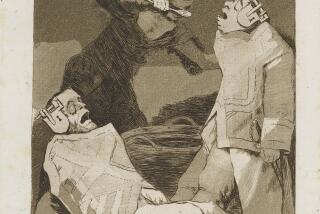Philosophical Apprenticeships by Hans-Georg Gadamer, translated by Robert R. Sullivan (MIT: $17.50; 198 pp.)
- Share via
The attraction that an autobiography exercises on a reader often has as much to do with the importance of a particular historical period as with the significance of the main character in the story. How does an age come to expression in a person? How does an individual’s life and work illuminate an epoch? The story of a philosopher’s life might seem an unlikely angle from which to review the horrors of our century. In “Philosophical Apprenticeships,” Hans-Georg Gadamer, professor emeritus at the University of Heidelberg, recounts his intellectual development in a way that deepens our understanding of recent history and of ourselves. One question repeatedly occurs to the reader of Gadamer’s work: How is it possible for a person writing in 20th-Century Germany to remain convinced of “the fact that the logos (or reason) is common to everyone”?
Gadamer structures his narrative around the people and places that form the main chapters of his life. He provides rare glimpses of some of the intellectual leaders of our era: Nicolai Hartmann who, as though still a student at St. Petersburg in Russia, “sat in winter in his unheated room in a quilted robe, a hot-water bottle in his foot-muff” doggedly writing books “often right up to dawn”; the “snide” Max Scheler, whose “enormous intellectual gluttony . . . so devoured him that whenever he met a colleague he would compel his participation simply by ripping pages out of whatever book he was reading and pressing them into the hands of the astonished companion”; Rudolph Bultmann, whose “unprecedented discipline and frugality” drove him to record “more than a small part of his scholarly production . . . on the backs of paid bills and letters and even on the unfolded insides of envelopes”; and above all others, Heidegger, “This Black Forest fellow, who from childhood had grown up with skis on (and who) often participated in our handball games.”
The story involving these and other noteworthy characters extends from the heady excitement of student days in Marburg’s “golden twenties,” through Gadamer’s post-war rectorship at the University of Leipzig and imprisonment by the Russians, to his eventual emergence as one of the leading philosophers in Europe and America. There are many points of interest along the way: morning-long breakfasts following Heidegger’s 7 a.m. lectures at Frieburg; 15 years of evening-long discussions in the modest home of Bultmann; the “terrible awakening” in 1933 when, Gadamer confesses, it became clear that “we could not absolve ourselves of having failed to perform adequately as citizens.” In the midst of the fury and destruction of world wars, the most poignant episode takes place in a quiet moment. Gadamer recounts teaching Rilke’s Duino Elgies on Dec. 4, 1943.
Ten days or so after the nearly total destruction of the center of the city (Leipzig) . . . , I sat in a still-sound building--but without heating, light, or windowpanes--and continued with the third elegy. Students were there--of course not all of them--each heavily bundled up and with a candle. Darkness.
Throughout these terribly difficult years, Gadamer constantly faces a dilemma. How is it possible, he asks, “to save my academic existence in Germany, but without making political concessions that could cost me the trust of my friends in the outer or inner emigration”? This is not a merely “academic” question; nor is it a question limited to a time and place other than our own.
What kind of philosophy emerges from such a life in such a world? As the leading proponent of what is commonly labeled “philosophical hermeneutics,” Gadamer develops a philosophy of dialogue that never loses sight of the historical situation of the participants. Hermeneutics, in general, is the art of interpretation in which one employs various strategies designed to come to terms with texts and their cultural artifacts. By extending the insights of his teacher, Heidegger, Gadamer formulates a method of interpretation that allows us to hear others anew by recognizing the unavoidable limitations of our own understanding.
Ever sensitive to our entanglement in history and tradition, philosophical hermeneutics discloses the inescapability of what Gadamer calls our “prejudices.” In this context, prejudice is not merely a negative limitation on thought and action but is a set of enabling conventions that mediate experience in historically determinate ways. The greatest prejudice, according to Gadamer, is believing that we are without prejudice. It is precisely this prejudice, perpetuated by the ideal of scientific objectivity, that gave rise to the forms of oppression under which Gadamer suffered: Hitler’s fascism and Stalin’s communism. When reason becomes totalistic, states become totalitarian.
Though Gadamer persists in believing (often under conditions that would seem to make such belief impossible) that we are all rational, he is equally convinced that our reason is not all. Recalling the Socratic dialogue to which his philosophy of dialogue is so indebted, Gadamer concludes: “A knowledge of our own ignorance is what human wisdom is.” By keeping us open to others in an “unending conversation,” Gadamer struggles to delay, at least for a while, the terrifying approach of The End.
More to Read
Sign up for our Book Club newsletter
Get the latest news, events and more from the Los Angeles Times Book Club, and help us get L.A. reading and talking.
You may occasionally receive promotional content from the Los Angeles Times.










